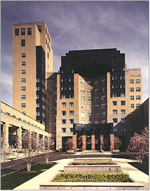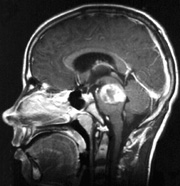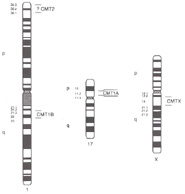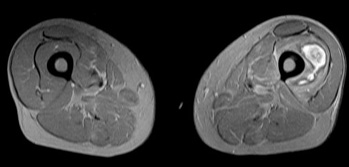 |
CWRU School of Medicine THIRD YEAR CORE CLERKSHIP IN NEUROSCIENCE Introduction and Overview |
 |
Welcome to the third year core clerkship in Neuroscience. More than any field, Neuroscience relies upon the oldest principles of medicine and the latest in modern technology. The foundation of neurologic diagnosis rests on the knowledge of neuroanatomy in conjunction with the neurologic history and physical examination. Advanced imaging techniques, immunologic studies and molecular genetics can then be applied to define the underlying disorder. Rapidly evolving advances now allow for treatments and surgical techniques of various neurologic disorders that were not possible a few years ago.
 |
The Neuroscience clerkship allows students direct hands-on experience with a variety of neurologic patients and disease processes. All students will have responsibilities for inpatient care under the supervision of either Neurology or Neurosurgery house officers and attendings. In addition, students will attend outpatient clinics every week. Each student will be assigned one of several available clinical rotations, including the University Hospital Neurology Ward Service, the University Hospital Neurology Consult Service, the Wade Park Veterans Administration Hospital Neurology Service (combined ward and consult), the University Hospital Neurosurgery Service, the MetroHealth Neurosurgery Service, the Rainbow Babies and Children's Hospital Pediatric Neurology Service, or the Cleveland Clinic Neurology Service. |
 |
Each Thursday, all students convene for didactic sessions covering core topics, including clinical aspects of neurology, pediatric neurology and neurosurgery. Following the didactic sessions, there is a Chairman's Conference which alternates between Neurology and Neurosurgery, after which follows a Neuropathology or Neuroradiology conference on alternative weeks. The clinical experience will vary among students, but the core clerkship content will be identical for students choosing Neurology, Pediatric Neurology or Neurosurgery. Likewise, all students will receive the same written examination at the end of the clerkship. This written examination will cover the core material taught during the Thursday sessions. Senior house officers and attendings will also evaluate each student in a written appraisal. Recommendation for honors, commendable and satisfactory grades will be based on scores from the examination and the evaluations by residents and faculty. |
Important information prior to the start of the Clerkship:
All students should contact the Neurology clerkship coordinator, Kristen Stacy, preferably by e-mail (kristen.stacy@uhhs.com), prior to the start of the clerkship with their first and second preferences for clinical assignments. Please request an e-mail confirmation back to ensure your request has been received. Clinical assignments include:
University Hospital Neurology Ward Service
University Hospital Neurology Consult Service
Wade Park Veterans Administration Hospital Neurology Service
(combined ward and consult)
University Hospital Neurosurgery Service
MetroHealth Neurosurgery Service
Rainbow Babies and Children's Hospital Pediatric Neurology Service
Cleveland Clinic Neurology Service
Assignments are made on a first come, first serve basis. All efforts will be made to accommodate each student's request.
 |
First day of the Clerkship: The first day begins at 8:00 a.m. in University Hospital, Hanna House, 5th floor conference room, for an orientation to the neurologic examination and history. At that time, students will meet the clerkship directors and coordinators, and will be given their clinical rotation, attending and resident assignments. |
On this website, you will find a host of useful material. Core study points, contact information, conference schedules, and details covering the evaluation process are available. Pay particular attention to the learning objectives for the clinical clerkship and the didactic neurology-neurosurgery material. These are the objectives all students are expected to master. All Neurology teaching vignettes are listed by their week and time. Reviewing these cases prior to the Thursday sessions will greatly aid each student's learning.
Please keep in mind, it is not possible to master the entire field of neuroscience during a several year residency, let alone a month clerkship. However, with diligent study, motivation and initiative, each student will be able to become proficient in the evaluation of neurologic patients and learn the core concepts of neuroscience every physician needs to know, regardless of the field of medicine or surgery he/she ultimately practices.
